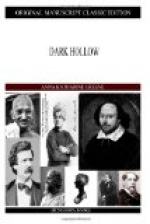Morning passed and the noon came, bringing Deborah an increased uneasiness. When lunch was over and Reuther sat down to her piano, the feeling had grown into an obsession, which soon resolved itself into a definite fear.
“What if an attack, such as I once saw, should come upon him while he sits upon the bench! Why have I not thought of this before? O God! these evil days! When will they be over!”
She found herself so restless that she decided upon going out. Donning her quietest gown and veil, she looked in on Reuther and expressed her intention; then slipped out of the front door, hardly knowing whither her feet would carry her.
They did not carry her far,—not at this moment at least. On the walk outside she met Miss Weeks hurrying towards her from the corner, stumbling in her excitement and so weakened in body or spirit that she caught at the unresponsive fence for the support which its smooth surface refused to give her.
At sight of Deborah’s figure, she paused and threw up her hands.
“Oh, Mrs. Scoville, such a dreadful thing!” she cried. “Look here!” And, opening one of her hands, she showed a few torn scraps of paper whose familiarity made Deborah’s blood run cold.
“On the bridge,” gasped the little lady, leaning against the fence for support. “Pasted on the railing of the bridge. I should never have seen it, nor looked at it, if it hadn’t been that I—”
“Don’t tell me here,” urged Deborah. “Let’s go over to your house. See, there are people coming.”
The little lady yielded to the other’s constraining hand and together they crossed the street. Once in the house, Deborah allowed her full apprehension to show itself.
“What were the words? What was on the paper? Anything about—”
The little woman’s look of horror stopped her.
“It’s a lie, an awful, abominable lie. But think of such a lie being pasted up on that dreadful bridge for any one to see. After twelve years, Mrs. Scoville! After—” But here indignation changed suddenly into suspicion, and eyeing her visitor with sudden disfavour she cried: “This is your work, madam. Your inquiries and your talk of John Scoville’s innocence has set wagging all the villainous tongues in town. And I remember something else. How you came smirking into this very room one day, with your talk about caps and Oliver Ostrander’s doings on the day when Algernon Etheridge was murdered. You were in search of information, I see; information against the best, the brightest—Well, why don’t you speak? I’ll give you the chance if you want it. Don’t stand looking at me like that. I’m not used to it, Mrs. Scoville. I’m a peaceable woman and I’m not used to it.”
“Miss Weeks—” Ah, the oil of that golden speech on troubled waters! What was its charm? What message did it carry from Deborah’s warm, true heart that its influence should be so miraculous? “Miss Weeks, you have forgotten my interest in Oliver Ostrander. He was my daughter’s lover. He was my own ideal of a gifted, kind-hearted, if somewhat mysterious, young man. No calumny uttered against him can awaken in you half the sorrow and indignation it does in me. Let me see those lines or what there is left of them so that I may share your feelings. They must be dreadful—”




